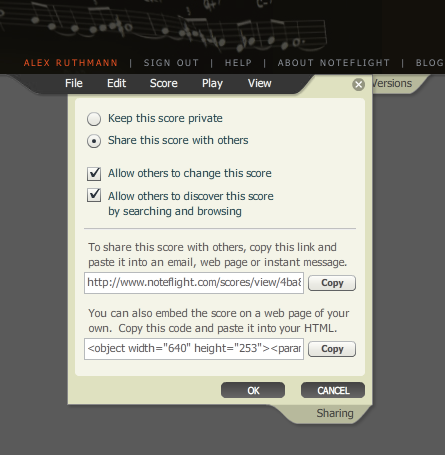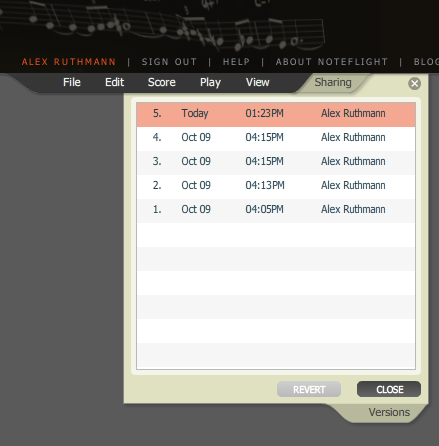 Earlier this month Evan Tobias posted about Noteflight, a new online flash-based notation application available at http://www.noteflight.com/. Over the past few weeks I have been exploring this software with college students in my Technology in Music Education course and with high school students enrolled in a beginning piano class at Lowell High School (LHS). Those of you who know me know how apprehensive I am when it comes to using notation software with students in general music or other technology classes in K-12 schools. Most of my concern centers around the common conflation of "notation software" with "composing software." All too often I see teachers using notation software as a technological endpoint rather than as a means to the musical end of live performance. However, Noteflight is not your ordinary notation software.
Earlier this month Evan Tobias posted about Noteflight, a new online flash-based notation application available at http://www.noteflight.com/. Over the past few weeks I have been exploring this software with college students in my Technology in Music Education course and with high school students enrolled in a beginning piano class at Lowell High School (LHS). Those of you who know me know how apprehensive I am when it comes to using notation software with students in general music or other technology classes in K-12 schools. Most of my concern centers around the common conflation of "notation software" with "composing software." All too often I see teachers using notation software as a technological endpoint rather than as a means to the musical end of live performance. However, Noteflight is not your ordinary notation software.What interests me about Noteflight is not the notation component. Instead, it is in the social tools that surround the notation engine. When you sign up at Noteflight.com (currently free) you create personal profile, just like you would at a social networking site like Facebook, MySpace or custom sites created at Ning.com. Once signed in, you can create a new score, view existing scores, or scores created by other users.
 Built in to the web application is the ability to share your scores with other users. These scores can be easily embedded just like a YouTube video in a class website. The embedded score can be played back by clicking on the play button and additional interactive functions are being planned which could be helpful in guided listening activities. Coming from a constructivist perspective, this functionality enables teachers to give students the opportunity to share their musical understanding in interactive ways within and beyond class time. For example, a band director could post a Noteflight score without added articulation. Students could then be assigned to add their own articulations to the score. During the next class, the students and director could choose a few scores to play through. This approach gives students the opportunity to make creative articulation decisions as composers, rather than traditionally learning it through listening and performing.
Built in to the web application is the ability to share your scores with other users. These scores can be easily embedded just like a YouTube video in a class website. The embedded score can be played back by clicking on the play button and additional interactive functions are being planned which could be helpful in guided listening activities. Coming from a constructivist perspective, this functionality enables teachers to give students the opportunity to share their musical understanding in interactive ways within and beyond class time. For example, a band director could post a Noteflight score without added articulation. Students could then be assigned to add their own articulations to the score. During the next class, the students and director could choose a few scores to play through. This approach gives students the opportunity to make creative articulation decisions as composers, rather than traditionally learning it through listening and performing.A variation on this assignment could be to post an audio file of a musical line performed with different articulations. Below the audio file, a director could post the notation for that performance, but again without articulation added. As an assessment, students could then open the score and add articulations that in their mind matched the recorded performance.
Right now, there are some limitations to accomplishing this, but I've been assured by Joe Berkovitz, CEO of Noteflight, that these functions are currently in development.

This screenshot shows the "version" function for Noteflight. As you work on a score in Noteflight, it periodically saves a snapshot of your piece and gives you access to it as a different "Version." If you open your score up to be added to by others, their versions show up in this box as well. At any point you can go back (revert) to a prior version. This is a cool function, not only because you can go back, but as a window into your students' compositional processes. Though not a full account of their process, these snapshots can provide an opportunity to have discussions with your students about the changes they made in their composition and are great starting points for assessment.
Here's a short piece composed by students of Tony Beatrice, UML graduate student in music education as part of an art-infused composing project:
Right now, the interactivity is limited to simple whole piece playback and playback within measures (click above the measure). Soon, functions will be added that will enable the composer to add additional interactivity through scripting. Very cool. :)
My students and Noteflight
My college students have been using Noteflight with beginning piano students at Lowell High School (LHS) for the past few weeks. Students in my class created incomplete duets to be co-composed and performed with their partner students at LHS. The music teacher at LHS has for the most part have been using Alfred's Adult Beginner Piano book to structure the curriculum. My college students wanted to add a composing/creativity aspect to the lessons. To do this, they created simple piano scores with either a chord progression in the bass clef or a melody in the treble clef (or some combination of the two) as a compositional frame to help scaffold the LHS students. Because the scores are online and viewable by the LHS students and my college students, both can practice alone and make edits to their duet scores. Tomorrow, they will meet again in person for a final run through and performance for the class. I'll post some of the pieces and performances here soon.
Because Noteflight is an online application, the potential for collaborative work and learning with other students is high. I'm in the middle of planning a distance composing project with another school later in the term through Noteflight. Facilitated by a custom Ning.com social network, students at LHS will notate compositions in Noteflight and share them with other students at a distance site. Ning will enable them to post their files and provide peer comment and critique. This use is inspired in part by the work at the Vermont MIDI Project, but instead centers on the students as providers of compositional critique and feedback, rather than professional composers.
I'm very excited to see how this technology develops. If you are interested in collaborative projects using Noteflight with your students, drop me an email.
-Alex Ruthmann





1 comment:
Nice blog, thank you for sharing such an amazing and informative post. Want to make a noise in the audio industry, the Sound Engineering courses are the best place to start.
School Of Audio Engineering Chennai
Audio Engineering Courses In Chennai
Audio Engineering In Chennai
Electronic Music Production Courses In Chennai
Best Sound Engineering Colleges In Chennai
Post a Comment